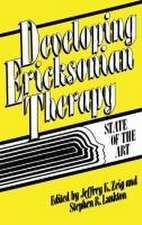Long-Term Forensic Psychiatric Care: Clinical, Ethical and Legal Challenges
Editat de Birgit Völlm, Peter Braunen Limba Engleză Paperback – 15 aug 2020
| Toate formatele și edițiile | Preț | Express |
|---|---|---|
| Paperback (1) | 531.72 lei 38-44 zile | |
| Springer International Publishing – 15 aug 2020 | 531.72 lei 38-44 zile | |
| Hardback (1) | 725.53 lei 38-44 zile | |
| Springer International Publishing – 27 mai 2019 | 725.53 lei 38-44 zile |
Preț: 531.72 lei
Preț vechi: 559.70 lei
-5% Nou
Puncte Express: 798
Preț estimativ în valută:
101.83€ • 104.92$ • 85.31£
101.83€ • 104.92$ • 85.31£
Carte tipărită la comandă
Livrare economică 21-27 februarie
Preluare comenzi: 021 569.72.76
Specificații
ISBN-13: 9783030125967
ISBN-10: 3030125963
Pagini: 343
Ilustrații: VI, 343 p. 15 illus., 12 illus. in color.
Dimensiuni: 155 x 235 mm
Ediția:1st ed. 2019
Editura: Springer International Publishing
Colecția Springer
Locul publicării:Cham, Switzerland
ISBN-10: 3030125963
Pagini: 343
Ilustrații: VI, 343 p. 15 illus., 12 illus. in color.
Dimensiuni: 155 x 235 mm
Ediția:1st ed. 2019
Editura: Springer International Publishing
Colecția Springer
Locul publicării:Cham, Switzerland
Cuprins
Preface.-Introduction.- Part I – The context: Asylums and deinstitutionalization: The Penrose hypothesis in the 21st century.-Challenges in comparing healthcare systems across different countries.- Long-term in forensic care in Europe.- Characteristic and needs of long-term patients in the UK.- Challenges in the provision of forensic services in Eastern Europe.- Ethical and human rights aspects of long-term.- Part II – Clinical aspects of long-term: What works for long-term forensic patients.- How to measure progress in forensic care.- Enhancing protective factors in the management of violence risk in long-term stay patients.- Challenges in the treatment of sex offenders.- Occupational therapy with long-term service users.- The importance of ward climate.- Quality of life in forensic settings.- Patient experiences of long-term.- A service user perspective.- Involving carers in forensic settings.- Part III – Alternative provision.- The closure of forensic-psychiatric institutions inItaly.- The Dutch model of long stay.- German long-term services in forensic settings.- Complementary model of long-term service as the result of reform of forensic psychiatry system after political transformation.- Attitudinal and organizational barriers to the introduction of long-term services.
Notă biografică
Birgit Völlm has been the Medical Director of the Forensic psychiatric hospital and Professor in Forensic Psychiatry at the University of Rostock since 2018. Before that she was a Professor of Forensic Psychiatry at the University of Nottingham and an Honorary Consultant Forensic Psychiatrist in the Enhanced Service for Personality Disorders (previously Dangerous & Severe Personality Disorders) at Rampton high secure hospital in the UK. Prof Völlm is a member (previously Chair) of the Board of the Forensic Section of the European Psychiatric Association and the Vice-Chair of the Forensic Section of the World Psychiatric Association. She was one of the experts on the NICE guidance group on the management of violence. Her main research interests include the neurobiology of antisocial personality disorders and social cognition, treatment of personality disorders, service development, comparisons between service delivery in different European countries and ethical issues in forensic psychiatry. She has held national and European grants on long-stay in forensic settings, the effectiveness of Individual Placement Support for forensic patients and on Circles of Support and Accountability for the reintegration of sex offenders into the community. She has published over 100 scientific papers and book chapters.Peter Braun is a psychologist and psychotherapist of the Pompe Foundation which is the forensic service of the Mental Health Organization Pro Persona in the Netherlands. He is also member of the Netherlands Register of Court Experts, member of the Dutch Institution for Psychologists (N.I.P.) and E.M.D.R. trained therapist. He was Chair of the European COST Action IS 1302 concerning a European Research Framework for (longterm) Forensic Psychiatry. He is member of the International Association for Forensic Mental Health Services and Chair of the Special Interest Group of that organization on Longterm Forensic Psychiatry. He is the Head of the Longterm Forensic Psychiatric Services in the Netherlands. He is interested in longterm forensic care and the effects of treatment atmosphere and nursing environment on quality of life and treatment results. He has cooperated in some studies concerning Quality of Life. He wrote a few chapters and articles on longterm forensic care
Textul de pe ultima copertă
This book provides an overview of forensic psychiatry, focusing on the provision of care in Europe as well as the legal and ethical challenges posed by long-term stays in forensic settings. Forensic psychiatric services provide care and treatment for mentally disordered offenders (MDOs) in secure in-patient facilities as well as in the community. These services are high-cost/low-volume services; they pose significant restrictions on patients and hence raise considerable ethical challenges. There is no agreed-upon standard for length of stay (LoS) in secure settings and patients’ detainment periods vary considerably across countries and even within the same jurisdiction. Thus far, little research has been conducted to identify factors associated with length of stay; consequently, it remains unclear how services should be configured to meet the needs of this patient group. This volume fills some of those gaps. Furthermore, it presents new research on factors associated with length ofstay, both patient-related and organisational. Various approaches to the provision of care for long-term patients in different countries are explored, including a few best practise examples in this specific area of psychiatry. The book also addresses the perspective of those working in forensic care by reviewing quality-of-life research and interviews with patients. The authors of this volume come from a range of professional backgrounds, ensuring a certain breadth and depth in the topic discussion, and even includes patients themselves as (co-)authors.
Caracteristici
Focuses on the legal and ethical challenges posed by long-term detention in forensic settings Describes patient-related and organisational factors associated with length of stay Co-written by actual patients
















![Internationalismen: Studien zur interlingualen Lexikologie und Lexikographie, aus: Internationalismen : Studien zur interlingualen Lexikologie und Lexikographie, [1]](https://i2.books-express.ro/bt/9783484311022/internationalismen.jpg)
